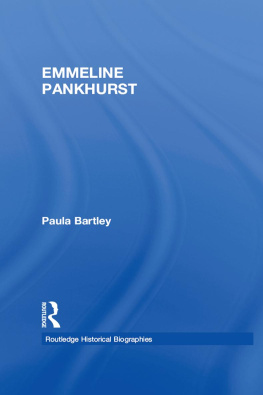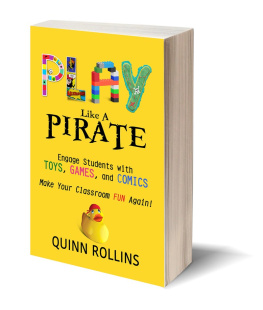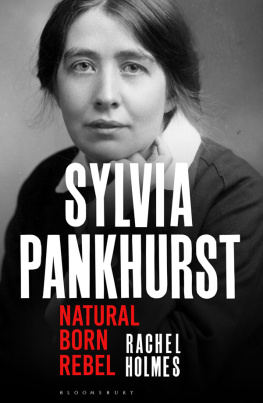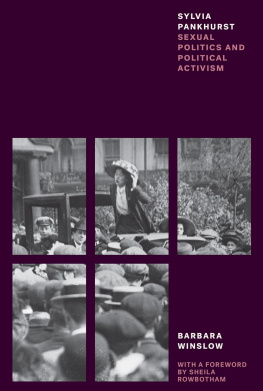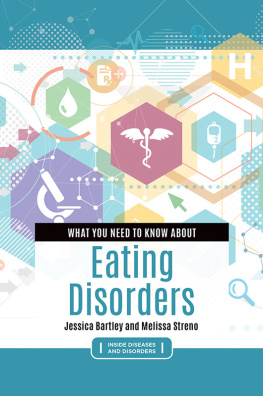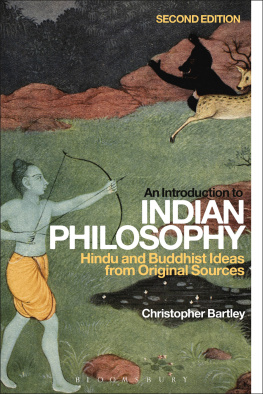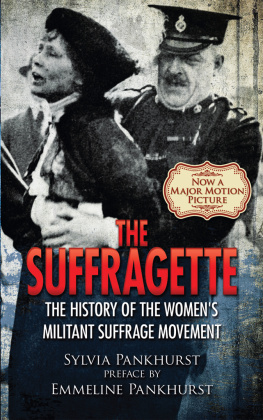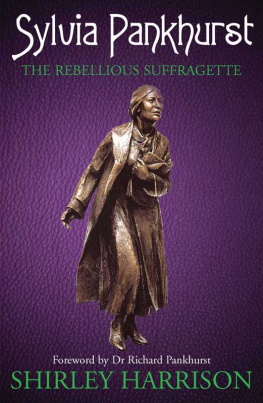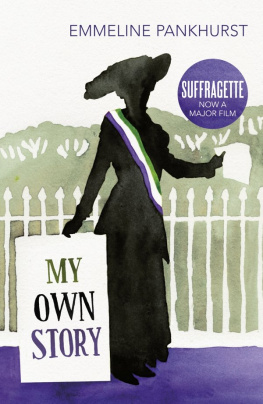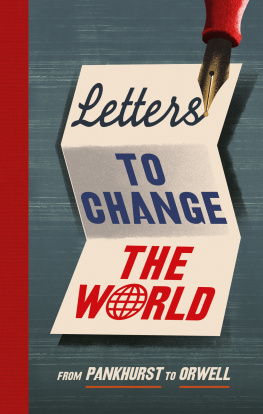EMMELINE PANKHURST
Emmeline Pankhurst was the most prominent campaigner for women's right to vote and was transformed into a popular heroine of the early twentieth century. Early in life she was attracted to socialism, then she grew into an entrenched and militant suffragette and ended up as a Conservative Party candidate. This new biography examines the guiding principles that underpinned all of Emmeline Pankhurst's actions, and places her achievements within a wider social and political context.
In this well-structured, fluent and lively account, Paula Bartley uses new archival material to assess whether Pankhurst should be seen as a heroine or a tyrant, a conservative or a progressive.
Paula Bartley is Senior Lecturer in History at the University of Wolverhampton. She has published widely on women in history, notably Votes for Women (Hodder, 1998) and Prostitution: Prevention and Reform in England(Routledge, 2000).
ROUTLEDGE HISTORICAL BIOGRAPHIES
SERIES EDITOR: ROBERT PEARCE
Routledge Historical Biographies provide engaging, readable and academically credible biographies written from an explicitly historical perspective. These concise and accessible accounts will bring important historical figures to life for students and general readers alike.
In the same series:
Bismarck by Edgar Feuchtwanger
Churchill by Robert Pearce
Franklin D. Roosevelt by Stuart Kidd
Gandhi by Crispin Bates
Gladstone by Michael Partridge
Henry VII by Sean Cunningham
Hitler by Martyn Housden
Jinnah by Sikander Hayat
Lenin by Christopher Read
Mao by Michael Lynch
Martin Luther by Michael Mullet
Martin Luther King Jr. by Peter J. Ling
Mussolini by Peter Neville
Nehru by Ben Zachariah
Stalin by Geoffrey Roberts
Trotsky by Ian Thatcher
First published 2002
by Routledge
2 Park Square, Milton Park, Abingdon, Oxon OX14 4RN
Simultaneously published in the USA and Canada
by Routledge
711 Third Avenue, New York, NY 10017
Routledge is an imprint of the Taylor & Francis Group
2002 Paula Bartley
Typeset in Garamond and Scala by Taylor & Francis Books Ltd
All rights reserved. No part of this book may be reprinted or reproduced or utilised in any form or by any electronic, mechanical, or other means, now known or hereafter invented, including photocopying and recording, or in any information storage or retrieval system, without permission in writing from the publishers.
British Library Cataloguing in Publication Data
A catalogue record for this book is available from the British Library
Library of Congress Cataloging in Publication Data
A catalog record for this book has been requested
ISBN 0415206502 (hbk)
ISBN 0415206510 (pbk)
For Reka Dudley and Olivia Hockridge
CONTENTS
PART I
A POLITICAL APPRENTICESHIP 18581903
PART II
THE SUFFRAGETTE STORY 190314
PART III
LIFE AFTER THE VOTE 191428
PLATES
(between pages 180 and 181)
ACKNOWLEDGEMENTS
I owe a huge debt to a number of people. Robert Pearce's critical acumen combined with his generosity of spirit made him the ideal editor. I should also like to thank Vicky Peters at Routledge for her careful reading of the text and her reassurance. I was fortunate to meet Michael Foot, whose late wife Jill Craigie had researched extensively into the lives of the suffragettes. Michael Foot was extraordinarily generous with his time, and I thank him for all the insights he shared with me. In the midst of her own research Karen Hunt generously read and commented most helpfully on my chapter on the ILP and socialist women. Diane Atkinson, Elizabeth Crawford and Angela V. John provided advice on sources and Myrna Goode and the late Philip Goode gave me access to their collection. Bill Bartley gave his time generously to help with research in the west of England. Colleagues and friends at the University of Wolverhampton were characteristically helpful and encouraging: Marie-Clare Balaam, Eva Kolinsky, Janis Lomas, Peter Neville, Phil Knowles, Rosie Miles, Lesley Tennick, Fiona Terry-Chandler and Malcolm Wanklyn among them. Special thanks to Pat Green, Martin Durham and Ginny Hartley, who all made very useful comments on various chapters, and to John Benson and Laura Ugolini, who read the complete manuscript and made many numerous suggestions for improvement. The Women's History Unit at the University of Wolverhampton gave me encouragement when I most needed it. My heartfelt thanks to all of you.
Many librarians and archivists offered invaluable help and I would like to thank them all. David Doughan, Fawcett Library; the British Library; Cambridge University Library; Colindale Newspaper Library; House of Lords Library; London School of Economics archive; the Public Record Office at Kew, especially Sheila Gopaulen; the Bodleian and especially Vivien Bradley; the National Register of Archives; Pankhurst Centre, Manchester, especially Emilli Doran; Greater Manchester Record Office; Manchester Register Office, particularly Jeffrey Adams; the staff of the Local Studies Unit and Social Science Library of the Manchester Central Library; Salford Local History, Salford; Pump House Archive and Museum, Manchester; John Rylands Library, Deansgate; John Rylands University Campus Library, Manchester; Salford Record Office; Salford University Library; Rochdale Local Studies Library; Working Class Movement Library, Salford, particularly Alain Kahan; the Portico Library, Manchester, particularly Ed Potten; and the Manchester Literary and Philosophical Society, particularly Stella Lowe; Gail Cameron at the Museum of London; Verity Andrews at the University of Reading Archives; and the library staff at the University of Wolverhampton.
My research involved using archives outside of England. When I visited the Isle of Man to research Emmeline Pankhurst's early life, many people shared their extensive knowledge with me. I am hugely indebted to Helen Leigh, who taught me Manx history, offered generous hospitality and put me in touch with Miss M. Critchlow, Roger Sims, Priscilla Lewthwaite and Mr Cowen, all of whom helped me with Emmeline Pankhurst's genealogical history. In particular, I would like to thank the Manx historian Patricia de Ban for her help on Emmeline's early life and her comments on my first chapter. My Canadian research was helped by a travel grant from the British Association for Canadian Studies and I would like to thank them for making my trip possible. I am grateful to a number of Canadians, especially Arthur and Doreen Gryfe, Larry McNally, Ghislain Malette, Judith Emery, Yuri Shimpo and Tom Tytor. Thanks also to Angus McLaren for his advice via the internet, which helped me trace the Canadian Social Hygiene Council; to Dawn Lemain for giving me permission to quote from her father Bill McNeill's recordings and to Margorie McEnaney for her interview with Nellie Hall Humpherson. While in Canada I made a number of friends, including Jeanette Neeson, Doug Hay, Mary Jane Mossman, Brian Bucknall and Peter and Flora Kelly, all of whom provided emotional sustenance as well as intellectual inspiration. Thanks to Sian Miles for introducing me to some of them. I was awarded a month's British Studies Fellowship by the Harry Ransom Center at the University of Texas. I should like to thank them and Roger Louis, Patricia Kruppa and the audience of the British Studies Seminar for their help and advice. During my visit, Lesley Hall, a true internationalist, put me in contact with Hal Smith and Judy McArthur, who generously shared their expertise on the American suffrage movement with me and provided the most delightful evening in Austin, Texas.

